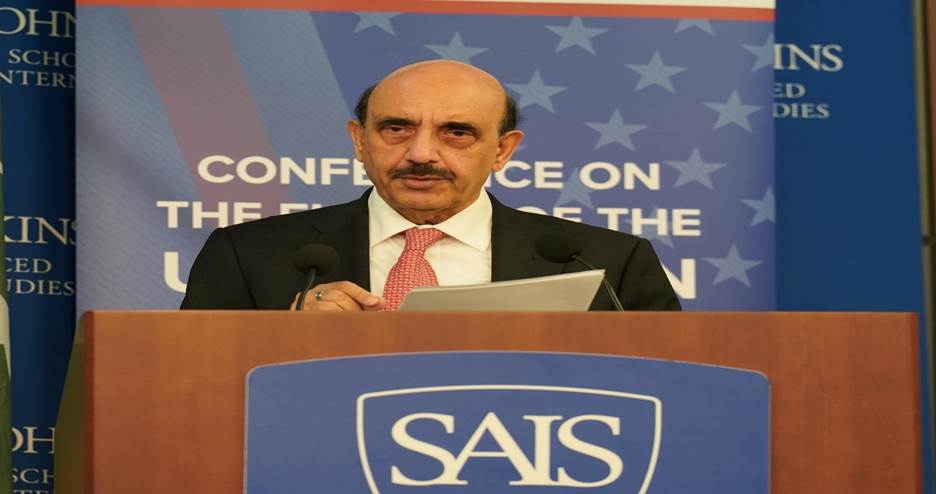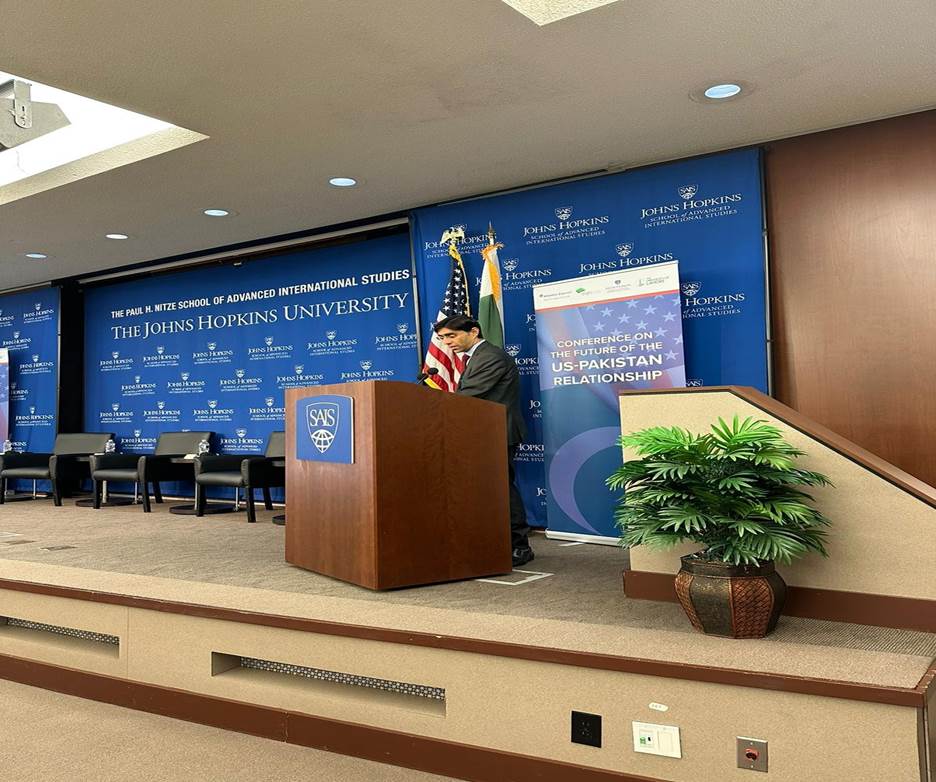
Ambassador Masood Khan
Conference on the Future of US-Pakistan Relations in Washington
By Elaine Pasquini
Photos by Phil Pasquini

Washington: Johns Hopkins University School of Advanced International Studies (SAIS), the University of Lahore, and the Atlantic Council, co-hosted a conference at SAIS on October 31 and November 1 titled “The Future of the US-Pakistan Relationship.”
“The prospects for US-Pakistan relations are bright and our ties are poised to grow in the future,” said Masood Khan, Pakistan’s ambassador to the US, delivering the keynote address.
The ambassador noted that the foundations for the continuing strategic and economic partnership which began soon after the creation of Pakistan have served the interests of both countries.
“Together we made the world safer through collaboration during the Cold War by fighting terrorism and by being comrades in UN-led peacekeeping and…other operations,” he said. “The spirit of solidarity between our two countries continues.”
Pakistan provided invaluable assistance to the US following its withdrawal of troops from Afghanistan in August 2021. “Pakistan helped the United States with massive evacuations from Afghanistan and continues to do so,” the ambassador said.
The US has assisted Pakistan through crises – from the Covid-19 pandemic to devastating climate-induced floods. With respect to covid, the United States delivered 78 million vaccine doses to Pakistan, making it the largest donor to the country. “We appreciate that the United States has also provided $80 million to us to beat the coronavirus and build capacity for disease surveillance,” Khan said.
Addressing the recent floods, the ambassador related that one-third of Pakistan was submerged in water and 33 million people affected by the disaster. Sustaining losses estimated to be around $40 billion, with the help of the international community, “we should be able to rebuild our destroyed infrastructure, houses, health care systems and educational institutions,” he explained.
The ambassador thanked the United States for providing $97 million in humanitarian assistance to support the rescue, relief and early recovery operations. “We also thank American citizens, including Pakistani-Americans, and US businesses for contributing another $27 million in cash and kind.”
He reminded the audience that Pakistan emits less than 0.4 percent of global greenhouse gases and yet it is the eighth most vulnerable country to climate change. “This is scientific data,” he emphasized. “As we ask for climate justice, we would work with the United States to leverage its technology and expertise to build climate resilient infrastructure that would include hydropower dams and alternative energy plants.”
The United States’ recent initiative announced by Ambassador Donald Blome in Islamabad to launch a green alliance was welcomed by the Pakistani government, Ambassador Khan said. Among other things, this would provide “an umbrella for our cooperation to develop weather-resistant hybrid seeds and promote linkages between our agricultural universities for research in GMOs, genetic energy and biotechnology.”
Pakistan hopes to scale up bilateral ties with the United States in the economic, technological, and educational domains. “This is not merely aspirational,” Khan stated. “Hard work is underway on both sides to translate this into policy.”
Pakistan, he noted, has taken far-reaching steps to make its regulatory regime business-friendly by streamlining taxation-expediting profit repatriation and enforcing intellectual property protection. “We are proactively working with the United States government on business climate enhancement,” he added.

Dr Moeed Yusuf, former Pakistani National Security Advisor, spoke about the importance of Pakistan’s national security policy in moving Pakistan forward to meet its potential and “compete in a world that is becoming more and more competitive and cutthroat when it comes to gaining economic dividends from the world.”
Economic security is necessary for military security, he argued. And the only way to ensure that the average Pakistani citizen enjoys physical, economic and psychological well-being is “through a secure economy and it’s only through that economy that you ensure continued strength of your defense sector,” he explained.
Yusuf stressed that Pakistan’s fundamental problem in terms of the economy is external imbalance which needs to be eliminated through non-debt-raising revenue, export, foreign direct investment, and remittances.
Another problem facing the economy is asset redistribution. “We are very bad with distributing the resources we have, both in terms of rich to poor and from core developed cities and regions to the periphery,” Yusuf said. “That is the other part that we have to fix.”
Changing the US private sector investor’s perception of Pakistan is one problem in drawing more American companies to do business in Pakistan. “While I am standing here and talking of Pakistan’s pivot to economic security and geo-economics, who is going to take that lead [in the US] to start convincing people that Afghanistan is done, terrorism is done, and we may have a narrative about Pakistan, but it’s time to move on,” he pondered.
Regarding US-Pakistan relations going forward, one problem is the constant need to explain “that we are not into camp politics,” Yusuf said. “This is a point that has been lost…but we have repeatedly said that it does not benefit us to pit one camp against the other. We are looking for a melting pot approach whereby we can create opportunities for the broader region and the US and China to come and co-invest.”
“We have very good relations with a number of countries,” Yusuf asserted. “China is one of them, but that does not change the fact that Pakistan has had, will continue to have, and wants to have, a relationship with the US that goes beyond security.”
The economic agenda took preeminence during the two-day event. In panels, including “New Economic Opportunities in the Technology Sector,” young entrepreneurs spoke enthusiastically about working in Pakistan.
“This is really an excellent time to be a start-up in Pakistan,” Shazia Khan, CEO of EcoEnergy, enthused. “Pakistan is a new frontier market.”
Monica Brand Engel, co-founder and managing partner of Quona, which invests in fintech innovators in emerging markets, concurred. “There are opportunities in Pakistan we are excited about,” she said.
Other panels tackled US-Pakistan relations in a multipolar world, modernizing Pakistan’s agriculture sector through greater private sector investments from the US, and promoting regional cooperation to combat climate change.
(Elaine Pasquini is a freelance journalist. Her reports appear in the Washington Report on Middle East Affairs and Nuze.Ink.)

